
Rob Attar: Many of your previous books have focused on the big campaigns and the most famous events of the Second World War. So what drew you to the relatively unknown Operation Biting?
Max Hastings: Because I’m getting a bit older and a bit slower, I want to focus on miniatures rather than the big stuff. So I’ve been picking small episodes that seem to illustrate important realities about bigger things – and which are also jolly good stories in their own right.
The Bruneval Raid [Operation Biting] in February 1942 was a British success story at a time when not much else was going well. And it involved all sorts of fascinating personalities – starting, of course, with Churchill. At that stage of the war, when so many battles were being lost, he always wanted to keep raids going on the occupied coast of Europe. This was partly to remind the Americans that we were still in the war business, partly to cheer up the British people, and also partly to serve some very important objectives.
What were those objectives?
What was at stake really mattered. Bomber Command, during its attacks into Europe, was suffering more and more from German radar-directed fighters. The British were catching a new sort of radar they didn’t know much about, which the Germans called the Würzburg-Gerät.
The genius of British scientific intelligence, Reg Jones, always liked to think that he could work out anything just by thinking about it long enough – but in this case, both he and the Telecommunications
Research Establishment felt there was no substitute for getting a look at the real thing. And suddenly they saw this aerial photograph, in December 1941, of a radar station near Bruneval, about 12 miles away from Le Havre. They could see this black thing down there, which they were pretty sure was a Würzburg antenna.
Denne historien er fra July 2024-utgaven av BBC History UK.
Start din 7-dagers gratis prøveperiode på Magzter GOLD for å få tilgang til tusenvis av utvalgte premiumhistorier og 9000+ magasiner og aviser.
Allerede abonnent ? Logg på
Denne historien er fra July 2024-utgaven av BBC History UK.
Start din 7-dagers gratis prøveperiode på Magzter GOLD for å få tilgang til tusenvis av utvalgte premiumhistorier og 9000+ magasiner og aviser.
Allerede abonnent? Logg på

Viking mussels
ELEANOR BARNETT digs into archaeological research to recreate a Viking-cum-AngloSaxon seafood dish from medieval York
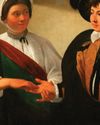
Fingers, frog's and fairies
Fortune telling was all the rage in the 16th and 17th centuries, and practitioners would stop at nothing to tap in to the supernatural. Martha McGill tells a story of Highland seers, tarot cards and encounters with the spirit world
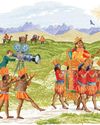
Nothing matches being with Alexander the Great on foot in the Hindu Kush
AT OUR LITTLE FILM COMPANY, MAYA VISION, we recently took the decision to digitise all of the rushes of our key films so that we could dispose of hundreds of boxes of tapes that had been kept in storage, throwing out stuff we thought we would never need again.

Library of the dead
Highgate Cemetery, created as a fashionable resting place for wealthy Victorian dead, is a veritable who's who of London's great and good. PETER ROSS roams the avenues of this most atmospheric necropolis
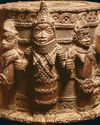
Slavery, exploitation and racism. These tragedies have long dominated histories of Africa. But there's another way to tell this story. And it's one that puts Africans right at the centre of their continent's extraordinarily rich and vibrant past
An 1414, in the Chinese city of Nanjing, a giraffe caused a stir. Amid a crowd of shocked, noble spectators, an official, leading the creature via a rope tied round its face, presented it to China's Yongle emperor. His officials said it was a qilin - an auspicious unicorn - which his sage governance had made appear.

England's forgotten hero
When the Hundred Years' War was reaching a climax, one man was fighting tenaciously to secure the English claim to the French crown. So why, asks Joanna Arman, is Henry V's formidable brother, John, Duke of Bedford, not better known?
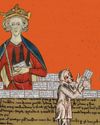
HENRY III AND THE MAGNA CARTA THAT MATTERED
King John's sealing of a charter at Runnymede in 1215 is one of the most feted moments of the Middle Ages. Yet, writes David Carpenter, it was the charter issued by his son 10 years later that became fundamental to England's history

Gutenberg publishes a pioneering new book
‘The printing press triggers an information revolution
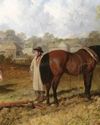
How empire ruptured rural Britain
We know that enslaved Africans and their descendants suffered in the distant colonies of empire. But, as Corinne Fowler explains, the colonial system also had dire impacts on people in the countryside of the 'motherland'
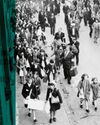
"I FELT VERY ALONE IN A WORLD GONE HORRIBLY MAD"
It was a moment of possibilities, dislocation and dread. Dan Todman tells the story of the 1.5 million urban Britons evacuated to the countryside at the start of the Second World War